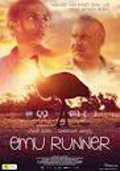
Directed by
Imogen Thomas
95 minutes
Rated PG
Reviewed by
Bernard Hemingway

Emu Runner
Synopsis: The story of nine-year-old Indigenous girl, Gem Daniels (Rhae-Kye Waites), whose mother unexpectedly dies leaving her with her older sister (Letisha Boney), brother (Rodney McHughes) and father (Wayne Blair) none of whom in her grieving does she feel close to. Instead Gem finds solace in the company of a wild emu, her mother’s totem animal.
Emu Runner is the directorial feature debut from Imogen Thomas, who wrote the film in consultation with Aboriginal Ngemba woman Frayne Barker, from Brewarrina, northwest of Dubbo, in rural New South Wales, home of the Ngemba people, where the film is set and was shot.
The synopsis of this film might suggest an indigenous version of Storm Boy 1976 but the strength of Emu Runner is that it doesn’t simply tie itself to the long history of warm and fuzzy family-focused films that have an animal as a central character. Some might say that that is because the emu is simply not amenable to appropriation by filmic anthropomorphicists but the real reason is that here the emu is a totem, not a pet.
Although Gem and her family live an essentially Western lifestyle, even if at the lower socio-economic end of it, the death of Gem’s mother brings up the young girl’s inarticulate awareness of her irreducible Aboriginality and her place in the white man’s world. Although Thomas is not an indigenous film-maker she sympathetically explores these issues, largely sub-textually, as the film unfolds its relatively simple story. Only in its latter stages, when a white social worker (Georgina Blizzard) tries to intervene in Gem’s “case” does the narrative feel a little contrived, even bordering on the didactic.
In the lead role Rhae-Kye Waites who is onscreen for most of the film gives a remarkable performance, one which is wise beyond her years. Evidently the rest of the cast with exception of Blizzard and Blair (who directed the The Sapphires in 2012 and the recent Top End Wedding) are untrained. At times this means the dialogue, already in places a little awkward, can sound stilted but in a way this lack of polish adds to the film’s realism. Here Michael Gibbs’s photography and a low key sound design do a fine job of taking us into classic Australian outback country whilst the film itself sensitively takes us into the divided heart of Australia.

Want more about this film?


Want something different?




